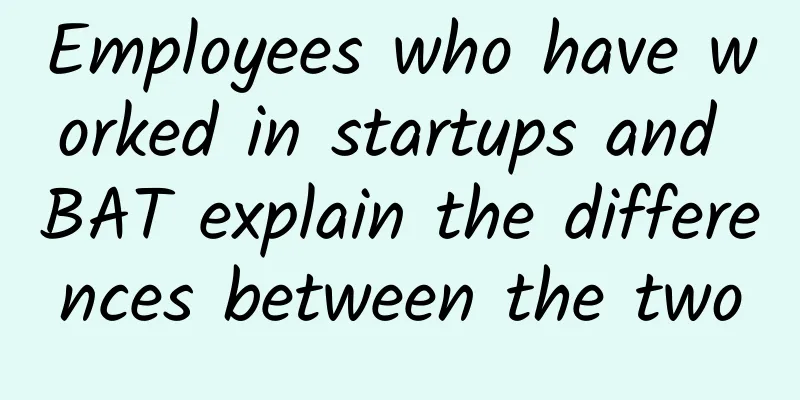Employees who have worked in startups and BAT explain the differences between the two

|
Many people flee from BAT because they can't stand these "have to" clauses. So, does working in a small startup mean that the sky is high and the clouds are vast, everything is harmonious, and you can avoid these? Not necessarily. First, let's take a look at what you can gain from a startup.
The answer to this question will be different depending on who is asking it. No one can ever answer the question of “where should you go”. A more meaningful approach is to look at what you will get and what you will have to accept in BAT and startups, and on that basis, make the choice that best suits your current situation and can best realize your future expectations. What is it like to work in a BAT-level company? Working in such a company, you can gain: 1. The company brand endorses the personal brand. At the same time, you will gain a lot of resources and connections. 2. A larger and more comprehensive industry landscape and vision. Small and beautiful things are mostly done by startups. Things like strategic landscape are done by large companies. Being in BAT is very helpful for establishing industry vision and landscape. In many cases, understanding the big picture first and then cutting into small things will be more efficient and in the right direction. 3. Get in touch with and learn from many elites. Although the proportion of elites decreases with the expansion of personnel, there are still many elites. 4. Professional working methods. Although the overall professionalism of the Internet industry is weaker than that of the financial industry or foreign companies, BAT's professionalism is basically the strongest in the Internet industry, and startups do not have the energy to take care of professionalism. 5. Sufficient space for learning and growth. This is relative to startups. BAT, which has no pressure to survive, has the ability to recruit newcomers and give them a learning period of three to six months. 6. Understand the development of multiple businesses, have a more global judgment and more sufficient information reserves. Small companies generally have only one business, but large companies have many business lines. The more you observe, the more comprehensive the business logic and the deeper the industry knowledge. In many cases, the sufficiency of information will affect the correctness of the decision. 7. BAT has tens of thousands of employees. It is very interesting to observe how companies manage so many employees effectively with unified processes. It can improve personal management skills. Working in BAT, you have to accept: 1. Individual competition is fierce and it is not easy to stand out. This is a general term for students with average levels. For exceptionally outstanding talents, they will shine wherever they go. 2. Office politics. Where there are people, there are rivers and lakes. The bigger the company, the more intense the political struggle. Endless wrangling, meetings, and struggles are all normal. 3. The division of labor is too detailed. Every task requires the cooperation of many teams to complete, because the division of labor is too detailed. The division of labor is a manifestation of social progress, but in terms of specific projects, it is the reason for reduced efficiency. 4. Long and complicated process. There is no other way. To manage tens of thousands of people on a large scale, a safe process is necessary. At the same time, due to the detailed division of labor, the process involves too many different roles, so the process is extremely long. This is a normal phenomenon. 5. A weak position with no say. Unless you are exceptionally outstanding and important to the company, you will basically have no say in bargaining. Unless you are qualified to bargain with your boss in the team, and your boss also has the ability to bargain with the company in the larger system, you can only complain and endure. Many people flee from BAT because they can't stand these "have to" clauses. So, does working in a small startup mean that the sky is high and the clouds are vast, everything is harmonious, and they can avoid these? Not necessarily. First, take a look at what you can gain in a startup. 1. A more attractive future of "financial freedom". Many people join startups because they are attracted by the result of "possible listing". Once successful, the financial benefits they can obtain will be the sum of working for a large BAT company for more than ten or even several decades. 2. More comprehensive practice opportunities. Unlike large companies, startups do not have detailed division of labor and strict processes. Due to the vague division of labor, you can try everything within your ability, which increases the breadth of learning; because there are no process restrictions, the efficiency is high and you can quickly try and fail. Practice makes perfect. What an employee learns in a startup company in one year will be more than three times what he learns in BAT. 3. Closer contact with elites. Different from the strict level restrictions of BAT, in the flat structure of startups, ordinary employees can also frequently contact founders. Excellent startup founders will also be directors or above in BAT. The opportunities to contact elites increase and benefit greatly. 4. Greater sense of accomplishment. Since startups have weak brands and few users, daily work can significantly promote business, and personal sense of accomplishment increases. In BAT, it is often impossible to understand what value your work brings to the business. However, if you want to quickly integrate into a startup and grow rapidly with the company, you will also have to face many unavoidable pains. Remember one sentence: in a startup, development for survival is more important than anything else . 1. Heavy workload, high pressure, and anxiety. Startups usually face huge competition in the industry. If they don’t run fast, they will die. This kind of company pressure is reflected on employees, which is heavy work tasks, common overtime hours, and anxiety that permeates the entire company. Therefore, working in a startup company requires strong stress resistance and adaptability, emotional management, and self-regulation. At the same time, you must accept the state of "not having your own life." 2. Chaos caused by no process, backlash caused by no management. While enjoying the high efficiency of no process, you also have to endure the chaos caused by it; while enjoying the flat and fast action, you also have to endure the various dissatisfactions caused by the company's inadequate management system. For startups, development is above all else, and processes, management methods, professional working methods, etc. will affect development efficiency. At the same time, with limited energy, the management is indeed unable to take care of these relatively "empty" matters. These chaos and backlashes need to be digested by individuals themselves. 3. Only the most basic welfare benefits are provided. 4. Do all the work by yourself. Do you work in a team in BAT? When you arrive at a startup, you have to get used to doing things by yourself for a long time. From small things like typos to big things like strategic directions, you have to do it all by yourself. At the same time, because the company is small, has few resources, and has little say in the industry, cooperation negotiations basically rely on face. As long as there is a choice, there will be "good" and "bad". There is no perfect choice in the world. No matter what kind of work environment you choose, there are the following principles to follow before making a decision: 1. Get as much information as possible. The more information you have, the lower the risk of decision-making. You can actively collect information online, or communicate more face to face. Sometimes informal communication is easier to get small details. 2. Clarify your long-term goals. Guided by the goals, work backwards to find the path to achieve them, and choose the decision that best matches the path to achieve them. 3. Understand the cost of decision-making and estimate the benefits of decision-making. Assess whether you can afford the cost and how likely you are to get the benefits. 4. Evaluate the development space after the choice. Choices that make the future broader are generally better than choices that reduce future possibilities. 5. Remember, don’t fantasize about warmth in the workplace. No matter which choice you make, the success or failure depends on your ability. It has nothing to do with feelings. |
<<: Recommended by experts: Must-read books for iOS development
>>: A Chinese team changes the world again! iOS9 can be jailbroken [Download]
Recommend
Build the user system of Internet financial APP from scratch!
Is the user system just a simple points/membershi...
New car-making forces saw a surge in sales in the first half of the year, one step closer to profitability
Now it is July, and the new car-making forces hav...
Omnichannel Promotion | How to find an effective user interaction strategy?
With the development of technological trends, a c...
In Praise of the Independent Programmer
[[149946]] Parkinson’s Theorem[1] tells us that “...
Presbyopia suddenly disappears, white hair suddenly turns black...6 diseases that suddenly "get better" are more dangerous!
In life, if a disease that has troubled you for a...
Musk: I don't expect others to recognize me
People like to classify Elon Musk and Apple found...
How to tell whether a copy is good or bad? Try matrix analysis
Sometimes we are very confident in our own copywr...
Reinventing "alchemy"! Can you get rich just by relying on microorganisms?
Although microorganisms are invisible to the nake...
Tianfu Chengdu Tea Tasting has its own star-rated studio [recommended collection]
Chengdu Pincha has its own studio: 135-5021-2450 ...
Technology and hard work? Can you eat hot pot meatballs safely?
As the weather gets colder, many people fall in l...
Graduated from a vocational high school and started from a junior college, why is he one of the top 2% of scientists in the world?
On September 16, 2024, Stanford University in the...
A preliminary study of Swift language learning - Mixing Object-C and Swift
After the Swift language comes out, new projects ...
E-commerce operations: 50 Taobao brand marketing notes
Taobao was born in 2003. The first batch of “Taob...
Are there any "four-in-one" creatures in the water? The strange-looking Zhang's unicorn shrimp
Recently, the international journal "Contemp...
Product operation and promotion: plan a real event!
Planning is also a basic ability of operation. No...









